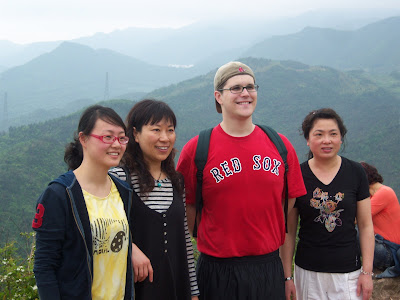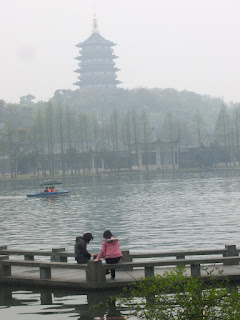 people and government. I have already written at length about the Olympic themed English-speaking theater competition. Well, just last weekend I did some hiking and at the summit guess what I found…a red banner welcoming the Olympics! Even the landscaping at the school celebrates the approaching games, with hedges planted and cut to resemble the Olympic Rings and other official logos. Yet as you know, internationally it seems that these Olympics have come to symbolize different things for different people.
people and government. I have already written at length about the Olympic themed English-speaking theater competition. Well, just last weekend I did some hiking and at the summit guess what I found…a red banner welcoming the Olympics! Even the landscaping at the school celebrates the approaching games, with hedges planted and cut to resemble the Olympic Rings and other official logos. Yet as you know, internationally it seems that these Olympics have come to symbolize different things for different people. The last few weeks have seen their fair share of controversy in
Teaching English in
Most people want to know why the western media is (in their words) “so biased,” and why western leaders are supporting what they see as separatism. After all, as one Chinese student said to me, “
Everyone here wants to know my opinion on this issue, but I must admit that I am cautious to carry an opinion. I have access to CNN and the BBC, as well as Chinese news sources. But, I still feel there is a serious lack of verifiable information at this time. I am trying to avoid applying my western expectations of media and becoming cynical; it’s just a fact that media is a different animal in
The media here is not privately owned, and therefore operates under the auspices of the government. People openly admit that much of it is propaganda, but I have also seen some interesting policy debates on CCTV9 (the English language station). The media in the
In 2000, the major media networks declared Al Gore as President of the
I am not saying that the Chinese media and the American media are the same or guilty of the same misinformation. That is not the case. Rather, just keep in mind that no media source has a perfect track record. Citizens should always think critically about information received from a secondary source – especially today’s media, whether it is motivated by government officials or Nielsen Ratings.
As I mentioned before, I have access to the BBC and CNN. These web pages load in (and only in) English. Some of the editorials have been harsh, and I know a few people who are authentically angry about what has been written. Many here feel that Americans are misinformed by a biased media, and are unnecessarily politicizing what should be a celebration of the Olympic Spirit. I am quick to point out that protests are fairly common in the history of the Olympics, and not an uncommon form of expression in western countries. While this answer is accepted by most, it does not seem to satisfy anyone. Still others insist that the “West” is threatened by
The good news (especially for a foreigner hoping to travel in the next few months) is that it seems both sides are taking steps to reconcile. Today I read that the new French President made a number of formal apologies and other moves to improve relations. And, in what I interpret as a partial acknowledgement of the recent criticism, the Chinese government has publicly made a number of statements on the issue of human rights. This includes the Minister of the Information saying, "We are clearly aware of the need to keep advancing human rights." The article, published in the English language version of China Daily, also stated that “the country still faces many problems and difficulties in its human rights development, with the democracy and legal system yet to be improved.” Actions speak louder than words, but nevertheless, such official statements should be taken seriously by observers. [As a side comment, I recommend spending a few moments performing the same site search on the BBC as you do on China Daily. Contrast and compare the content.]
Yet, of course, I have friends in
As usual, I eat the traditional food and play ping pong with everyone and anyone who is up for a game. In exchange I have tried to expose my students to American musical genres, but the language barrier has prevented us from analyzing the lyrics deeply enough. After a fit of brainstorming, I finally came up with a worthwhile unit that everyone could participate in: baseball!
The average Chinese person considers baseball a “wealthy sport” that requires expensive equipment. Baseball is not only unpopular, it basically does not exist. But, given that the population loves hand-eye coordination sports (ping pong, badminton, etc.) I just refuse to accept the status quo. Full baseball equipment is expensive, but not so with wiffle ball! My mother airmailed me 2 bats and 4 wiffle balls, and I built my lesson plans.
First we learned the vocabulary of the equipment and positions. We learned the lyrics and sang “Take Me Out to the Ballgame.” We read an article about the Chinese Olympic Baseball Team, and wrote a short opinion essay on the future of baseball in
Using the stone pattern on the campus’s
There is something special about sports that can transcend everything else. Certainly sports are not unique in this way; I have seen music, art, and food perform the same feat of bringing people together. Indeed, I have had many such moments here in
As world leaders address the many pressing issues worthy of political cooperation, I am beginning to see the primacy of personal relationships ahead of politics. After all, being “right” alone does not mean you can be effective in creating change; not to mention “right” can be a matter of perspective. So, it seems reasonable to suggest that things might progress more smoothly if our political solutions were born from strong and positive personal relationships. From this perspective, I am especially proud to be part of our exchange program.
I apologize if I seem a little dramatic, or if I am inflating the significance of exchange programs and teaching a few kids to play baseball… but the mood is that dramatic right now in
When I look at my Chinese friends I see hard-working common folks who shop at Wal-Mart and just want to give their kid a better life. Their government isn’t perfect, and they know it, but change does not happen over night. They value their traditions, but are curious about other people too. Sometimes they feel stressed out about money, or tired at the end of the week, but that does not stop them from having a good time when friends are around.
I am proud to call a number of people here my friend, and believe that with a little patience and honesty between us, we can accomplish more as friends than we will otherwise. Our government, media, etc. is different - but fundamentally people are people, and for the time being, that is what I am going to focus on.

****EPILOGUE:
Here are a few excerpts I pulled from my students' essays on the future of baseball in China. My impression is that there is a debate within China between those who favor international experiences and those are more cultural traditionalists. It may be a stretch to say these excerpts can serve as a primary source of this cultural debate, but it is worth noting the context. The class was almost evenly divided as to whether or not baseball would ever be popular in China.
“Everyone knows
“I think the most important two characters are the batter and the pitcher. So everyone wants to be one of the two and doesn’t want to be the other characters.”
“It is very expensive for Chinese right now. But Chinese is richer and richer.”
“We know baseball is very popular in
“Baseball will be at the Olympics and the Olympics this year will be held in
“Because everything about the baseball was very expensive, so I think the Chinese may not like it.”
“It’s difficult to get a team together.”
“If there is a very handsome baseball player, he is good at it and he is famous. Then a lot of people will try to play baseball because of him.”
“As communication between
“No coach, no experience, no players and even no fans. So I think that baseball won’t be popular.”
“As the world touch in with each other more and more, baseball games will attract more and more people’s eyes.”
“Equipment is impossible to find.”
“Baseball isn’t very popular here just because we don’t know it well. So in my opinion, baseball will be known by Chinese maybe 10 or 20 years later, at that time, you will see Chinese playing baseball everywhere.”
“Baseball is not a very safe sport. If a person first plays baseball, maybe he can’t control the ball, so the naughty ball may hurt people.”
“Baseball has been dropped from the Olympics in 2012… it will make people less interested in baseball.”
“There are TV and computers in every family. They can watch it at home.”
“No. Chinese people don’t like violent sports. Baseball is too violent.”
“No. Baseball is harder to learn than such as basketball and football. And as we all know, people play baseball need a large place. But
“Teamwork is very important in playing baseball, and teamwork is also important nowadays.”
“Firstly, I think baseball developed very slowly in the past years. It shows that many Chinese people are not interested in playing baseball…. Baseball is too heavy, as Chinese are very thin and small, it’s not easy for them to do well in baseball.”
“Chinese like sports of all kinds.”
“In my opinion baseball will be popular in
“Baseball may be popular in
***





























